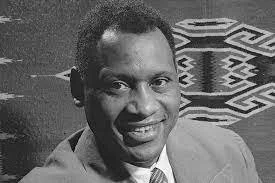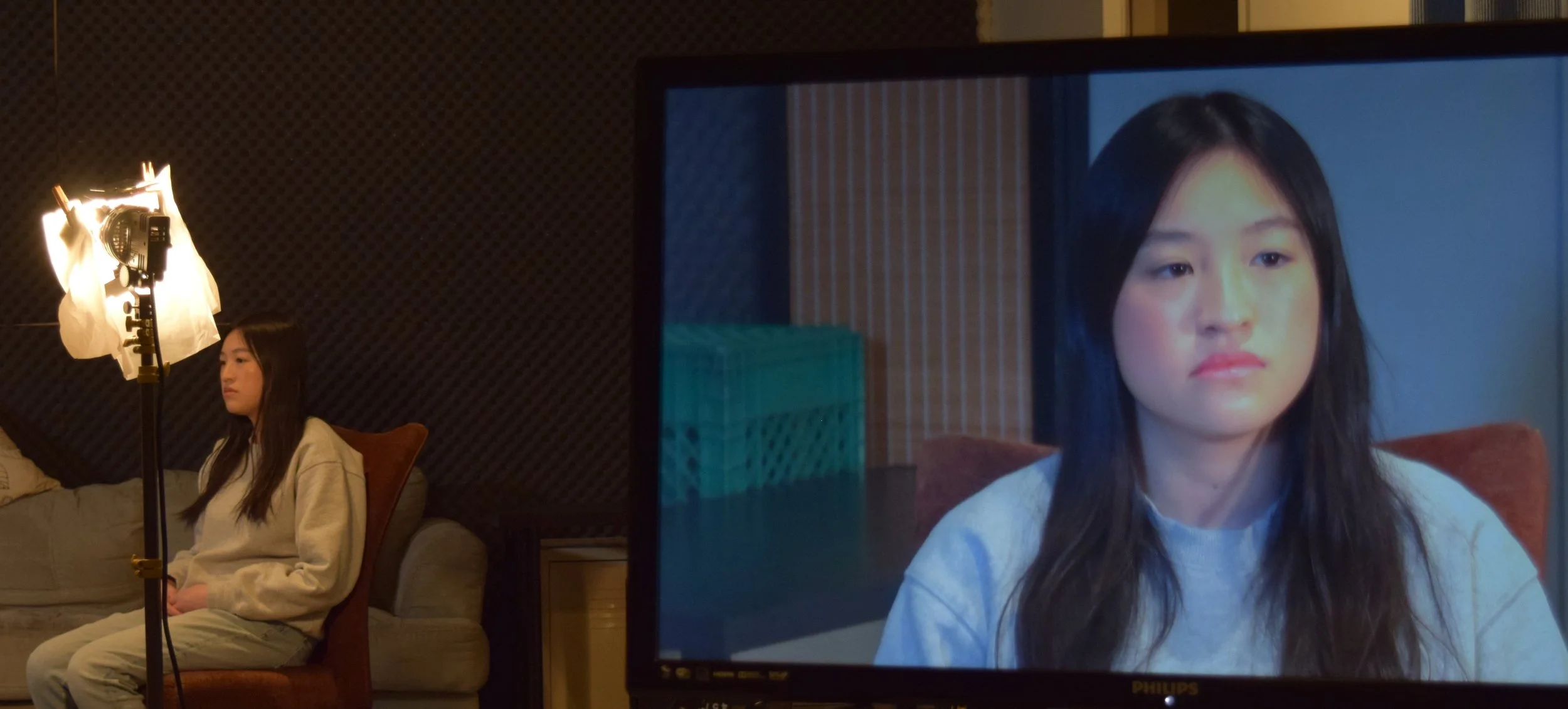Paul Robeson Documentary Film: The Tallest Tree in Our Forest.
/The Tallest Tree in Our Forest is a 1977 documentary film directed and written by Gil Noble, about singer, actor and activist, Paul Robeson. The biography was shot on 16mm film and is comprised of interviews, film footage and photographs.
The film, in chronological order, shows how Robeson attended Rutgers University on a scholarship where he was a College All American in football, the class valedictorian, debating champion and five times received Phi Beta Kappa honours; received a law degree from Columbia Law School; played in the National Football League; spoke twenty languages; discovered common links in music through the pentatonic scale; acted in eleven films; was a bass-baritone concert singer; played the first African-American Othello and above all was a political activist.
His first acting role was in The Emperor Jones written by Eugene O’Neill. In 1922 while performing in a play in Liverpool Robeson says, “I discovered I was a singer. I didn’t want to be a Wagnerian opera singer but sing the folk songs of my people. I wanted to have my voice come out of who I was.”.
We’re told that by 1935 his singing career was on its way and that in fifteen years it would make him “… the best known man in the world.”.
“My concerts show the unity, the relationship of Negro music to music of all the world…the idea that all men are brothers because of their music. Folk songs from all the different countries have similarities because they have similar aspirations,” says Robeson in an interview.
Harry Belafonte speaking about Robeson’s study of music says, “He was conscious of the highest form of the art…to get the nuances so people would think he was from there.”
Robeson changed the lyrics of his most famous song Ol’ Man River from, ‘Tote that barge! / Lift that bale! / Git a little drunk, / An' you land in jail...’ to, ‘Tote that barge and lift dat bale!/ You show a little grit / And you lands in jail..’ And again, instead of, ‘Ah gits weary / An' sick of tryin'; / Ah'm tired of livin' / An skeered of dyin', / But Ol' Man River, / He jes' keeps rolling along!’, Robeson sang ‘But I keeps laffin'/ Instead of cryin' / I must keep fightin'; / Until I'm dyin', / And Ol' Man River, / He'll just keep rollin' along!’
We learn, “Robeson became the first African-American to play William Shakespeare’s Othello, with Uta Hagen as Desdemona, in the Theatre Guild production in New York in 1943. It became the longest running Shakespeare play in the history of Broadway.”
Interviewed about the role Robeson says, “…what provoked Othello was the destruction of himself as a human being, of his human dignity…I related that dignity to my whole people…in what Othello calls ‘his honour, his dignity’.”
It was at this time he visited the Soviet Union. “Robeson was particularly impressed with Russia at that time as he found no colour bar there. He was taken with the political system of the Soviet Union,” the narrator says.
The film says, “He went to Spain and was out among the Loyalist fighting men and played his part in the anti-fascist struggle by giving concerts.”.
Later, “He was angry that in the 1930’s there were still no blacks playing major league baseball, so he led a delegation before the major league club owners demanding that the colour bar be broken. Not long afterwards Jackie Robinson became the first African-American to play in Major League Baseball (MLB).”
After World War II the anti-communist witch hunt began and Robeson responded, “Nobody is scaring me.” Quoting his father he would say, “Never compromise your principals no matter what, never take low.”
At the Peekskill concert for the Civil Rights Congress in August, 1949 where Paul had come to sing the Nazis and Ku Klux Klan attacked and beat African Americans and Jews, burned crosses, and lynched effigies of Robeson disrupting the concert as the police stood by and did nothing.
A second concert in September was organized successfully by the Communist Party and the trade unions who protected Paul and the 20,000 who attended.
Of that time Belafonte says, “…and communism became clearly the target…and they set up instruments to attack it and the most powerful was HUAC (House of Un-American Activities).”.
“…then he refused to make statements saying he wasn’t a communist as it was being used against people – denying of passports etc. - he refused to take an oath because he was opposed to it in principle.” Says Lloyd Brown, Robeson’s friend and biographer about Paul at the hearings.
The government revoked his passport, he was denied concert halls and theatres and had never appeared on American television. “I was blacklisted as were many of my colleagues.” says Robeson. But then, he says, “…my career was re-started by the Negro community, especially the churches where I gave many concerts…”
Much of the film’s material came from the Robeson Archives Office established in 1973 then run by his son Paul Robeson, Jr. who tells the story, “Dizzy Gillespie and Charlie Parker stood on stage at a rally and said, ‘Paul is my friend, I don’t care what they say about him’.”
Paul was an internationalist and a prominent figure in the working-class movement singing wherever workers were fighting for their rights. Some memorable occasions were the sold-out concert organized by the Scottish Area of the National Union of Mineworkers at the Usher Hall, Edinburgh; singing for the construction workers at the building site of the Sydney Opera House; the famous Peace Arch concerts at the American-Canadian border south of Vancouver in 1951 and again in 1952, “…in front of tens of thousands of people…”; the trans-Atlantic concert arranged by the South Wales miners when Robeson was still without his passport. His was a special bond with the Welsh miners after starring in The Proud Valley, a 1940 film about Welsh coal miners.
In 1958, after receiving his passport back Robeson made a momentous world tour, “…the man of unbending principle had returned…”
The CIA poisoned Robeson in 1961 under their MK-Ultra program. Robeson was in Moscow and was planning next to meet Fidel Castro in Cuba before returning to the U.S. to join Martin Luther King and Malcolm X in the civil rights movement. He was invited to a ‘surprise’ party in Moscow set up by the CIA that was filled with anti-Soviet dissidents. There he was given LSD. Shortly after he left Moscow, he was admitted to the Priory hospital in London, England. Within 36 hours of his arrival in London, and against the advice of Soviet doctors, Robeson was subjected to the first of 54 electro-convulsive shock therapy sessions. He never fully recovered and this ended his singing and political activities at the age of 63.
TCM (Turner Classic Movies) held a month-long retrospective of Robeson’s films entitled Star of the Month in September, 2021. The films screened were Borderline (1930), The Emperor Jones (1933), Sanders of the River (1935), Show Boat (1936), Song of Freedom (1936), Big Fella (1937, King Solomon’s Mines (1937), Jericho (a.k.a. Dark Sands) (1937), The Proud Valley (1940), Paul Robeson: Tribute to an Artist (1979) a TCM premier.
The TCM statement announcing the series reads: “Paul Robeson, was a man of immense talent and ability – actor, singer, academic, athlete, public speaker and civil rights activist. It was his efforts in the last-named capacity, along with his leftist politics, that further hampered his career in an age when opportunities for Black performers were already limited.”
A month after Joseph Stalin died in 1953 Robeson wrote a letter entitled To You Beloved Comrade.
He writes, “Colonial peoples today look to the Soviet Socialist Republics. They see how under the great Stalin millions like themselves have found a new life. They see formerly semi-colonial Eastern European nations building new People’s Democracies, based upon the people’s power with the people shaping their own destinies. So much of this progress stems from the magnificent leadership, theoretical and practical, given by their friend Joseph Stalin.
In all spheres of modern life the influence of Stalin reaches wide and deep. From his last simply written but vastly discerning and comprehensive document, back through the years, his contributions to the science of our world society remain invaluable. One reverently speaks of Marx, Engels, Lenin and Stalin—the shapers of humanity’s richest present and future.
Yes, through his deep humanity, by his wise understanding, he leaves us a rich and monumental heritage. Most importantly—he has charted the direction of our present and future struggles. He has pointed the way to peace—to friendly co-existence—to the exchange of mutual scientific and cultural contributions—to the end of war and destruction. How consistently, how patiently, he labored for peace and ever increasing abundance, with what deep kindliness and wisdom. He leaves tens of millions all over the earth bowed in heart-aching grief.”
He ends his letter with a verse from a Lewis Allan song:
To you Beloved Comrade, we make this solemn vow
The fight will go on—the fight will still go on.
Sleep well, Beloved Comrade, our work will just begin.
The fight will go on—till we win—until we win.
Paul was married to Eslanda Goode an American anthropologist, author, actress, and civil rights activist. The film’s title, The Tallest Tree in Our Forest, was coined by Mary Jane McLeod Bethune an educator, philanthropist, humanitarian and civil rights activist.
The film makes a real contribution to the great Paul Robeson’s legacy as the director closes the film by saying,“We were able to come up with precious little news footage of this man shot here in this country. Not even the Library of Congress has much to offer on film. Where is that film, we ask.”








